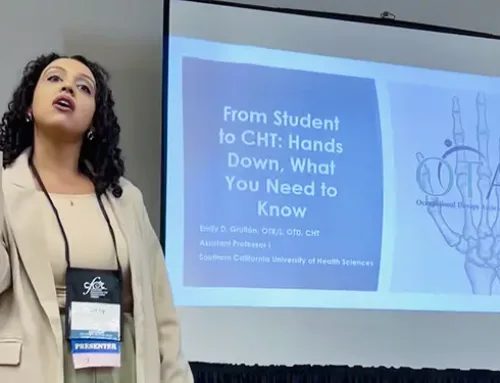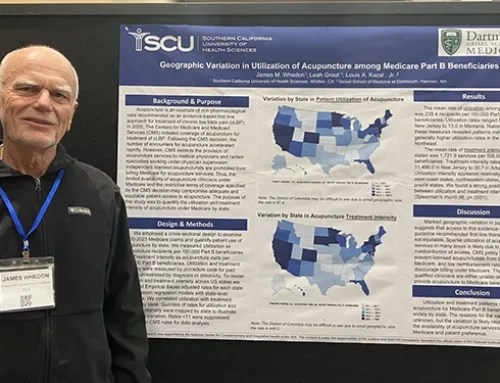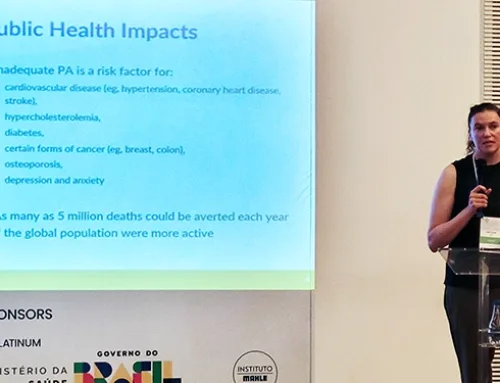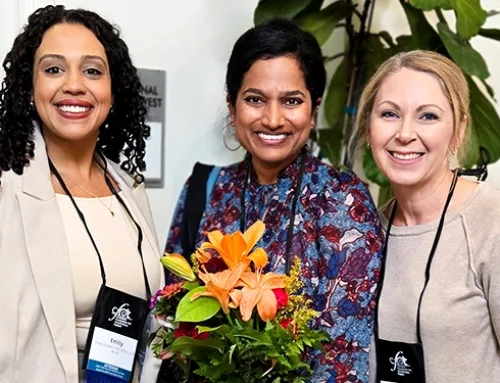A Journey to the Roots of Acupuncture and Chinese Herbal Medicine (ACHM): SCU’s Global Approach to ACHM Education
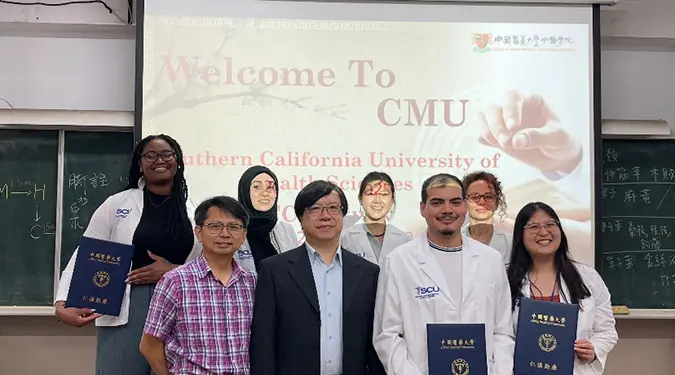
During Spring Break, students from the Southern California University of Health Sciences (SCU) Acupuncture and Chinese Herbal Medicine (ACHM) program travel across the Pacific to immerse themselves in the heart of Traditional Chinese Medicine (TCM) at China Medical University (CMU), a world-renowned institution consistently ranked among Taiwan’s top universities for medical programs. This unique educational exchange is part of an ongoing partnership between SCU and CMU—it blends centuries-old tradition with cutting-edge healthcare innovation, offering students an experience that goes far beyond the classroom.
The two-week program is designed to give students a full academic and cultural immersion. In the first week, they attend traditional Chinese medicine classes at CMU, learning alongside faculty and local students. The second week shifts to clinical observation at CMU-affiliated hospitals, where students shadow practitioners and see how TCM is applied in real-world patient care. Weekends are reserved for cultural exploration, giving students the chance to experience Taiwan’s rich traditions, food, and history.
Mayas Damer (third-year SCU student) said stepping onto the CMU campus was an eye-opening moment. “The sheer size of the university and the hospitals was incredible,” she recalled. “The technology in their labs and study rooms far exceeded what I expected, and it was inspiring to see the resources available to students there.”
Classmate Hallie Takenaga (third-year SCU student) echoed that sentiment, pointing to CMU’s modern herbal pharmacy as a highlight. “The herbs were stored in a wall system that would light up to show exactly where each herb was located for a patient’s prescription. It was such an efficient blend of tradition and technology.”
Axel Alvarez (third-year SCU student) was impressed by the way modern healthcare seamlessly integrated with TCM. “Watching how physicians integrated TCM with biomedicine in a hospital setting was incredible. I’m used to seeing acupuncture as a more individualized, clinic-based practice in the U.S., but here it was applied on a larger scale—treating multiple patients at once and preparing herbal formulas on the spot.”
While SCU students learn both Eastern and Western medical principles at home, visiting CMU allowed them to observe how deeply integrated Traditional Chinese Medicine is in Taiwan’s healthcare system, and how the same could be true here at home
The pace and precision of the practitioners struck Kiajera Blackstone (third-year SCU student). “Doctors inserted needles quickly, without using guide tubes, and treated so many patients at once, but everything was accurate. I want to learn how to do that.”
For Mayas, patient comfort was just as impressive as practitioner skill. “Patients were completely at ease—it’s such a normal part of life there. In the U.S., we take extra time to explain everything because acupuncture isn’t as ingrained culturally.”
The trip wasn’t just about seeing different acupuncture methods; it was about understanding an entirely different approach to healthcare.
Kiajera appreciated how equally valued Traditional Chinese Medicine and Western medicine are in Taiwan. “They integrate the two systems, treating them as equals. For rehabilitation, they focused on classical acupuncture points and herbal formulas, and the results were amazing.”
Hallie noted that CMU students receive highly specialized training, rotating through hospital departments such as internal medicine, pediatrics, gynecology, and traumatology. “We don’t yet have that level of integration in U.S. hospitals. Following specialists in each department gave us a glimpse of what’s possible for the future of integrative healthcare.”
Axel came away with a renewed professional vision. “It’s made me more determined to bridge the gap between TCM and conventional medicine in my own practice. I want to cultivate the same kind of patient confidence I saw in Taiwan, where people are comfortable seeking acupuncture for both chronic and acute conditions.”
Dr. Lawrence Lung Sheng Hsiao, SCU professor and trip leader, sees the CMU partnership as an unparalleled learning opportunity.
“This experience deepens students’ understanding of Traditional Chinese Medicine and exposes them to diverse approaches to healthcare. Observing clinical practice in Taiwan broadens their diagnostic and treatment repertoire and expands their knowledge of how TCM and Western medicine can work together.”
Dr. Hsiao also highlighted the professional benefits. “Studying abroad gives students a competitive edge, expands their professional networks, and fosters adaptability—qualities that are highly valued in today’s global healthcare environment.”
SCU students who attended the trip reinforced a desire to keep exploring acupuncture on a global scale. Mayas hopes to return to CMU in the future; Kiajera is considering additional international study; and Hallie wants to experience acupuncture in other countries like Japan and Korea.
Their advice for future students?
“Go. No matter what—just go,” said Kiajera. “It’s a once-in-a-lifetime opportunity.”
“Ask questions, take notes, and keep an open mind,” added Mayas.
“You’ll grow as a practitioner and as a person,” said Hallie.
“It’s inspiring to see TCM living, evolving, and responsive to modern health challenges,” said Axel.
SCU’s international exchange with CMU exemplifies SCU’s commitment to whole-person, culturally competent healthcare education. By combining immersive global experiences with rigorous academic training, SCU prepares graduates to thrive in a diverse and interconnected world.
Learn More About the Acupuncture and Chinese Herbal Medicine Program at SCU
Related Posts

